Thegrader
On this page, you find all documents, package deals, and flashcards offered by seller THEGRADER.
- 661
- 0
- 0
Community
- Followers
- Following
661 items
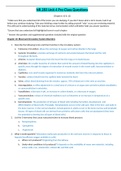
NR 283 Unit 4 Pre-Class Questions
NR 283 Unit 4 Pre-Class QuestionsMake sure that you understand all of the terms you are studying, if you don’t know what a term means, look it up before you continue studying. Take your thinking a step further by asking yourself “why” as you are reviewing material. This will lead to understanding of the material versus memorization which will better help you answer questions. *Ensure that you understand all highlighted terms in each chapter * Answer the question and supplemental questio...
- Exam (elaborations)
- • 8 pages •
NR 283 Unit 4 Pre-Class QuestionsMake sure that you understand all of the terms you are studying, if you don’t know what a term means, look it up before you continue studying. Take your thinking a step further by asking yourself “why” as you are reviewing material. This will lead to understanding of the material versus memorization which will better help you answer questions. *Ensure that you understand all highlighted terms in each chapter * Answer the question and supplemental questio...
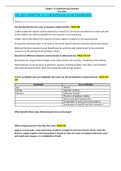
NR 283 CHAPTER 12- CARDIOVASCULAR DISORDERS
NR 283 CHAPTER 12- CARDIOVASCULAR DISORDERSList and describe the four ways to measure cardiac function. PAGE 228 Cardiac output the volume of blood ejected by a ventricle in one minute and depends on heart rate and stroke volume, the volume pumped from one ventricle in one contraction. Cardiac reserve the ability of the heart to increase output in response to increased demand. Preload the mechanical state of the heart at the end of diastole with the ventricles at their max volume. Afterload ...
- Exam (elaborations)
- • 9 pages •
NR 283 CHAPTER 12- CARDIOVASCULAR DISORDERSList and describe the four ways to measure cardiac function. PAGE 228 Cardiac output the volume of blood ejected by a ventricle in one minute and depends on heart rate and stroke volume, the volume pumped from one ventricle in one contraction. Cardiac reserve the ability of the heart to increase output in response to increased demand. Preload the mechanical state of the heart at the end of diastole with the ventricles at their max volume. Afterload ...
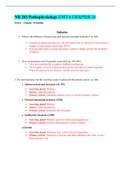
NR 283 Pathophysiology UNIT 6 CHAPTER 16
NR 283 Pathophysiology UNIT 6 CHAPTER 161. What is the difference between steroidal and non-steroidal hormones? (p. 403) • Steroids are lipids that enter the cell and nucleus and act directly in the nucleus to engage in transcription (messenger RNA). • Non-steroidal needs a second messenger system to finally activate the formation of mRNA. 2. How are hormones most frequently controlled? (p. 403-404) • They are controlled by a negative feedback mechanism. • For example, as leve...
- Exam (elaborations)
- • 5 pages •
NR 283 Pathophysiology UNIT 6 CHAPTER 161. What is the difference between steroidal and non-steroidal hormones? (p. 403) • Steroids are lipids that enter the cell and nucleus and act directly in the nucleus to engage in transcription (messenger RNA). • Non-steroidal needs a second messenger system to finally activate the formation of mRNA. 2. How are hormones most frequently controlled? (p. 403-404) • They are controlled by a negative feedback mechanism. • For example, as leve...
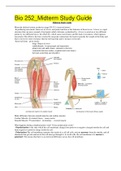
Bio 252_Midterm Study Guide
Bio 252_Midterm Study GuideMuscular skeletal system as physics (page329-331) (synovial joints) -In producing movement, bones act as levers, and joints function as the fulcrums of these levers. A lever is a rigid structure that can move around a fixed point called a fulcrum, symbolized by. A lever is acted on at two different points by two different forces: the effort (E), which causes movement, and the load or resistance, which opposes movement. The effort is the force exerted by muscular contr...
- Exam (elaborations)
- • 12 pages •
Bio 252_Midterm Study GuideMuscular skeletal system as physics (page329-331) (synovial joints) -In producing movement, bones act as levers, and joints function as the fulcrums of these levers. A lever is a rigid structure that can move around a fixed point called a fulcrum, symbolized by. A lever is acted on at two different points by two different forces: the effort (E), which causes movement, and the load or resistance, which opposes movement. The effort is the force exerted by muscular contr...
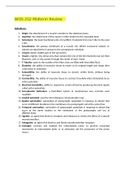
BIOS 252 Midterm Review
BIOS 252 Midterm Review Definitions: 1. Origin: the attachment of a muscle’s tendon to the stationary bone. 2. Insertion: the attachment of the muscle’s other tendon to the moveable bone 3. Sarcomere: the basic functional units of myofibril. It extends from one Z disc to the next Z disc. 4. Sarcolemma: the plasma membrane of a muscle cell. Where transverse tubules (t-tubule) are attached to it and go to the sarcoplasmic reticulum. 5. A band: darker middle part of the sarcomere. 6. I ...
- Exam (elaborations)
- • 19 pages •
BIOS 252 Midterm Review Definitions: 1. Origin: the attachment of a muscle’s tendon to the stationary bone. 2. Insertion: the attachment of the muscle’s other tendon to the moveable bone 3. Sarcomere: the basic functional units of myofibril. It extends from one Z disc to the next Z disc. 4. Sarcolemma: the plasma membrane of a muscle cell. Where transverse tubules (t-tubule) are attached to it and go to the sarcoplasmic reticulum. 5. A band: darker middle part of the sarcomere. 6. I ...
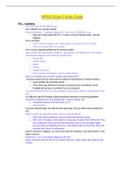
NR324 Exam 3 Study Guide
NR324 Exam 3 Study GuideHIV – 7 questions - You cannot get HIV through kissing. - Not a disease you can get casually. - Retroviral disease – it replicates backward – that’s why it is difficult to cure. o Many are living longer with HIV. It is more a chronic disease today. Just like diabetes. - HIV is not AIDS o AIDS is the end stage of HIV. Takes about 8-10 years from HIV to AIDS. o Some do develop AIDS very quickly. - HIV is a virus suppresses/destroys the immune system....
- Exam (elaborations)
- • 34 pages •
NR324 Exam 3 Study GuideHIV – 7 questions - You cannot get HIV through kissing. - Not a disease you can get casually. - Retroviral disease – it replicates backward – that’s why it is difficult to cure. o Many are living longer with HIV. It is more a chronic disease today. Just like diabetes. - HIV is not AIDS o AIDS is the end stage of HIV. Takes about 8-10 years from HIV to AIDS. o Some do develop AIDS very quickly. - HIV is a virus suppresses/destroys the immune system....
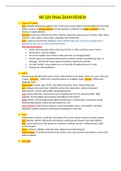
NR 324 FINAL EXAM REVIEW
NR 324 FINAL EXAM REVIEW1. Types of Traction Skin: Weights attached to patient’s skin to decrease muscle spams and immobilize the extremity before surgery. Ex Bryant traction (for hip dysplasia in children) and Buck ‘s traction for hip fracture in adult patients). Skeletal: Screws are inserted into bone. Used for long bone fractures such as femur, tibia, fibula, humerus, ulna, radius, metacarpals, phalanges and metatarsals. Halo: used for cervical bone fractures. Nurse should make sure wr...
- Exam (elaborations)
- • 7 pages •
NR 324 FINAL EXAM REVIEW1. Types of Traction Skin: Weights attached to patient’s skin to decrease muscle spams and immobilize the extremity before surgery. Ex Bryant traction (for hip dysplasia in children) and Buck ‘s traction for hip fracture in adult patients). Skeletal: Screws are inserted into bone. Used for long bone fractures such as femur, tibia, fibula, humerus, ulna, radius, metacarpals, phalanges and metatarsals. Halo: used for cervical bone fractures. Nurse should make sure wr...
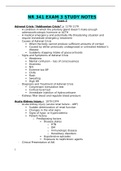
NR 341 EXAM 3 STUDY NOTES
NR 341 EXAM 3 STUDY NOTESAdrenal Crisis “Addisonian Crisis” p. 1178-1179 - A condition in which the pituitary gland doesn’t make enough adrenocorticotropic hormone or ACTH - A medical emergency and potentially life-threatening situation and require immediate emergency treatment - Causes of Adrenal Crisis • When the body cannot produce sufficient amounts of cortisol • Caused by either previously undiagnosed or untreated Addison’s disease • Suddenly stopping intake of glucoc...
- Exam (elaborations)
- • 44 pages •
NR 341 EXAM 3 STUDY NOTESAdrenal Crisis “Addisonian Crisis” p. 1178-1179 - A condition in which the pituitary gland doesn’t make enough adrenocorticotropic hormone or ACTH - A medical emergency and potentially life-threatening situation and require immediate emergency treatment - Causes of Adrenal Crisis • When the body cannot produce sufficient amounts of cortisol • Caused by either previously undiagnosed or untreated Addison’s disease • Suddenly stopping intake of glucoc...
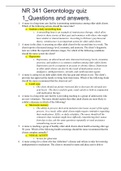
NR 341 Gerontology quiz 1_Questions and answers.
NR 341 Gerontology quiz 1_Questions and answers.1. A nurse in a long-term care facility is promoting reminiscence among older adult clients. Which of the following actions should the nurse take? a. Institute a daily storytelling hour i. A storytelling hour is an example of reminiscence therapy, which allow clients to share stories of their past and reminisce with others who might have similar or shared memories. According to Erikson’s psychosocial theory, reminiscence is an important action ...
- Exam (elaborations)
- • 4 pages •
NR 341 Gerontology quiz 1_Questions and answers.1. A nurse in a long-term care facility is promoting reminiscence among older adult clients. Which of the following actions should the nurse take? a. Institute a daily storytelling hour i. A storytelling hour is an example of reminiscence therapy, which allow clients to share stories of their past and reminisce with others who might have similar or shared memories. According to Erikson’s psychosocial theory, reminiscence is an important action ...
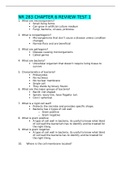
NR 283 CHAPTER 6 REVIIEW TEST 1
NR 283 CHAPTER 6 REVIIEW TEST 11. What are microorganisms? • Small living forms • Can grow in artificial culture medium • Fungi, bacteria, viruses, protozoa. 2. What is nonpathogenic? • Microorganisms that don’t cause a disease unless condition changes. • Normal flora and are beneficial 3. What are pathogens? • Disease causing microorganisms • Called germs 4. What are bacteria? • Unicellular organism that doesn’t require living tissue to survive 5. Charact...
- Exam (elaborations)
- • 9 pages •
NR 283 CHAPTER 6 REVIIEW TEST 11. What are microorganisms? • Small living forms • Can grow in artificial culture medium • Fungi, bacteria, viruses, protozoa. 2. What is nonpathogenic? • Microorganisms that don’t cause a disease unless condition changes. • Normal flora and are beneficial 3. What are pathogens? • Disease causing microorganisms • Called germs 4. What are bacteria? • Unicellular organism that doesn’t require living tissue to survive 5. Charact...
